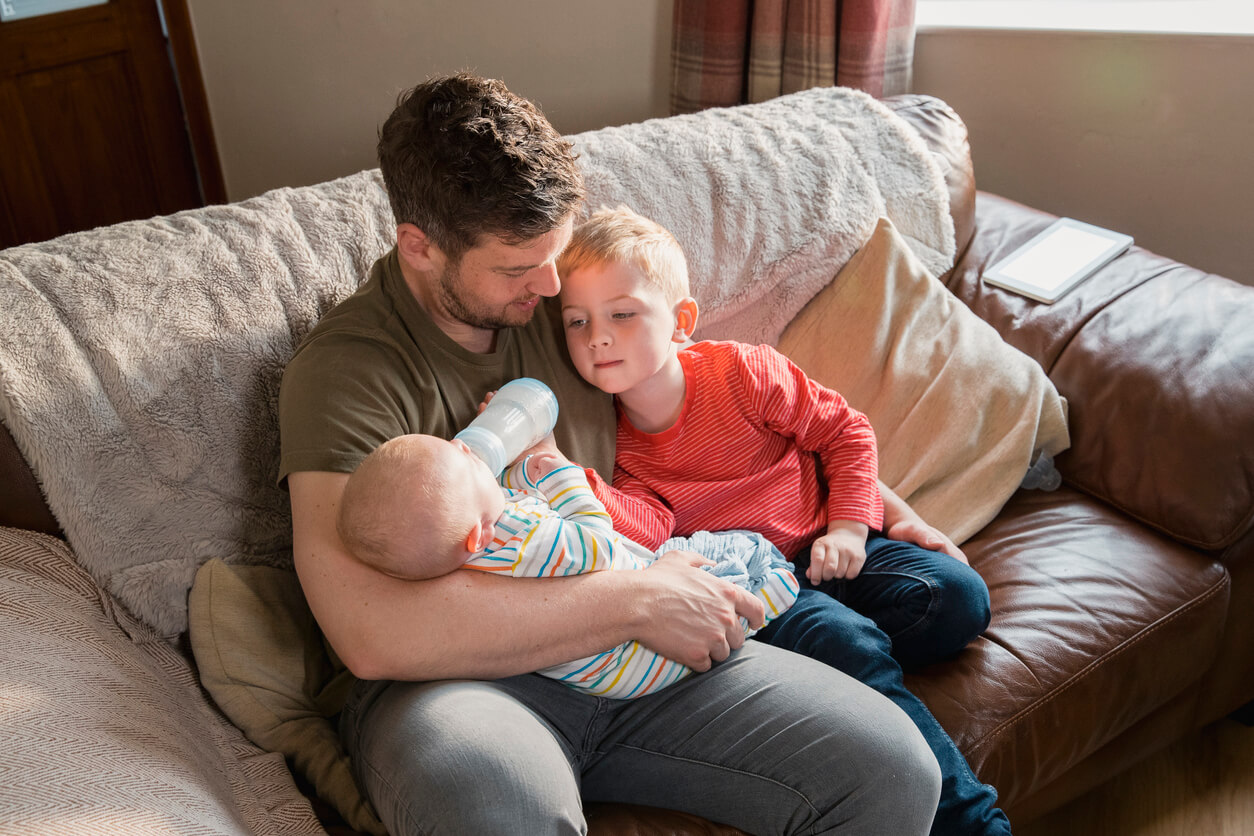Accompanying Our Children in the Transition from Infancy to Childhood

The childhood of little ones passes in the blink of an eye. At one moment, they’re helpless beings who are totally dependent on their parents, and the next, they begin to gain more autonomy, little by little. Knowing how to accompany our children in their transition from infancy to childhood is extremely important in order to support them through positive parenting.
The first birthday of babies is a very special moment for the whole family. Not only does it represent the time spent with them, but it also shows us that we should make the most of and enjoy their early childhood. After 12 months of age, children begin to leave their baby stage to enter their toddler stage.
What characterizes the transition from infancy to childhood?
The period of time between 12 and 36 months of life is popularly known as the toddler stage. A time of development in which the little ones experience a series of cognitive, emotional, and physical changes that will allow them to cultivate their individuality to begin to establish more social relationships.

It’s a crucial stage in the healthy growth of children, as during these first three years, they’ll be highly influenced by their environment. This will lead them to gradually cultivate their personality, self-esteem, and self-confidence, in addition to learning to be excellent children and replicate good life habits, thanks to the example provided by their parents.
These are some characteristics of the “toddler” stage, which represents the transition from infancy to childhood.
1. The development of their gross and fine motor skills
During the first three years of the life of our little ones, their development takes giant steps. This can be easily observed, as, from their first birthday, they begin their gross motor development by acquiring movement. First, with their timid crawling, which will later become their first steps, and finally the complete control of their balance.
In addition, their fine motor skills will be increasingly perfected, as they’ll be able to make more precise and refined movements. This is thanks to the improvement of their hand-eye coordination. Likewise, the development of language, which is accompanied by the acquisition of social skills, will also play an important role because they allow children to begin to communicate.
2. The formation of their unique personality
The first 36 months of children’s lives allow them to gather enough information from their environment to begin to develop their personality. So, it’s not surprising that, around the ages of two and three, children experience the famous “no stage”. This is a period that helps them understand the power of their words over their parents’ attitudes and allows them to take part in decision-making.
3. Fostering their independence and autonomy
Although during their first three years, children continue to require their parents’ full attention, when they begin to develop their movement and language, independence begins to make its first steps.
This is because they begin to realize that they’re independent from their mom or dad and can perform simple actions on their own. That’s why, during this period, it’s very important to motivate them to reach small achievements and teach them by example in order to perfect them.
Tips to accompany children in their transition from infancy to childhood
The toddler stage is characterized by the great neuronal activity that little ones experience to gain new skills and strengthen their personality. For this reason, it’s essential that we accompany and guide our children in a loving and respectful way. Depending on the upbringing and education we give them, we can have a positive or negative impact on their physical and emotional development.
These are some helpful recommendations to use with your children.
1. Cultivate a secure attachment
Being present in our children’s lives and exercising active parenting in their emotional development is crucial. For this reason, try to accompany your little ones in every step they manage to take and show them your love and constant respect so that they generate a secure attachment with their parents that gives them the confidence to move forward.
Because of this, use positive parenting, where you educate and correct them with empathy. In addition, of course, give them signs of affection such as kisses, hugs, and words of support. This way, your children will grow up cultivating their self-esteem and confidence and will learn by example how to treat other people.
2. Encourage their creativity and autonomy
Although during their first three years, little ones are still learning to move freely and to master their fine motor skills, you should encourage them to perform simple activities that allow them to gain autonomy and independence. This is something of utmost importance for them to feel useful at home and acquire the necessary knowledge to gradually face new goals.

So, be patient and respectful, as it can be a complex stage if we don’t have enough empathy. Your children will naturally begin to explore their environment and do things that may cause some stress. However, keep in mind that no one was born knowing everything, so use all your emotional intelligence to calm possible tantrums.
3. Impose limits and encourage good habits
Children need the physical and emotional support of their parents to learn to differentiate between what’s right and what’s wrong. Because of this, set limits in a loving and respectful way in your home so that they can be obeyed. This way, your children will know how to behave in stressful situations by controlling their emotions in an intelligent way.
Also, keep in mind that the example we provide them will be the fuel that will allow them to acquire good or bad habits. So, be aware of the mentoring role you have in your children’s lives and instill in them good practices such as simple hygiene and eating routines. This way, you’ll teach them by your actions how to take care of themselves and others.
Accompany your children with love in their transition from infancy to childhood
Being the guides and role models for the little ones during their toddler stage is an obligation that all parents have with their children. So, accompany them with love and respect and teach them through games and dialogue all those skills that every good person needs to know to give the best of themselves.
Finally, remember to be very patient and empathetic in order to recognize all the emotional and physical needs that your children require. This way, you’ll prepare them little by little from home to face their new stages of development. This is achieved by fostering their autonomy, self-esteem, and self-confidence every day.
The childhood of little ones passes in the blink of an eye. At one moment, they’re helpless beings who are totally dependent on their parents, and the next, they begin to gain more autonomy, little by little. Knowing how to accompany our children in their transition from infancy to childhood is extremely important in order to support them through positive parenting.
The first birthday of babies is a very special moment for the whole family. Not only does it represent the time spent with them, but it also shows us that we should make the most of and enjoy their early childhood. After 12 months of age, children begin to leave their baby stage to enter their toddler stage.
What characterizes the transition from infancy to childhood?
The period of time between 12 and 36 months of life is popularly known as the toddler stage. A time of development in which the little ones experience a series of cognitive, emotional, and physical changes that will allow them to cultivate their individuality to begin to establish more social relationships.

It’s a crucial stage in the healthy growth of children, as during these first three years, they’ll be highly influenced by their environment. This will lead them to gradually cultivate their personality, self-esteem, and self-confidence, in addition to learning to be excellent children and replicate good life habits, thanks to the example provided by their parents.
These are some characteristics of the “toddler” stage, which represents the transition from infancy to childhood.
1. The development of their gross and fine motor skills
During the first three years of the life of our little ones, their development takes giant steps. This can be easily observed, as, from their first birthday, they begin their gross motor development by acquiring movement. First, with their timid crawling, which will later become their first steps, and finally the complete control of their balance.
In addition, their fine motor skills will be increasingly perfected, as they’ll be able to make more precise and refined movements. This is thanks to the improvement of their hand-eye coordination. Likewise, the development of language, which is accompanied by the acquisition of social skills, will also play an important role because they allow children to begin to communicate.
2. The formation of their unique personality
The first 36 months of children’s lives allow them to gather enough information from their environment to begin to develop their personality. So, it’s not surprising that, around the ages of two and three, children experience the famous “no stage”. This is a period that helps them understand the power of their words over their parents’ attitudes and allows them to take part in decision-making.
3. Fostering their independence and autonomy
Although during their first three years, children continue to require their parents’ full attention, when they begin to develop their movement and language, independence begins to make its first steps.
This is because they begin to realize that they’re independent from their mom or dad and can perform simple actions on their own. That’s why, during this period, it’s very important to motivate them to reach small achievements and teach them by example in order to perfect them.
Tips to accompany children in their transition from infancy to childhood
The toddler stage is characterized by the great neuronal activity that little ones experience to gain new skills and strengthen their personality. For this reason, it’s essential that we accompany and guide our children in a loving and respectful way. Depending on the upbringing and education we give them, we can have a positive or negative impact on their physical and emotional development.
These are some helpful recommendations to use with your children.
1. Cultivate a secure attachment
Being present in our children’s lives and exercising active parenting in their emotional development is crucial. For this reason, try to accompany your little ones in every step they manage to take and show them your love and constant respect so that they generate a secure attachment with their parents that gives them the confidence to move forward.
Because of this, use positive parenting, where you educate and correct them with empathy. In addition, of course, give them signs of affection such as kisses, hugs, and words of support. This way, your children will grow up cultivating their self-esteem and confidence and will learn by example how to treat other people.
2. Encourage their creativity and autonomy
Although during their first three years, little ones are still learning to move freely and to master their fine motor skills, you should encourage them to perform simple activities that allow them to gain autonomy and independence. This is something of utmost importance for them to feel useful at home and acquire the necessary knowledge to gradually face new goals.

So, be patient and respectful, as it can be a complex stage if we don’t have enough empathy. Your children will naturally begin to explore their environment and do things that may cause some stress. However, keep in mind that no one was born knowing everything, so use all your emotional intelligence to calm possible tantrums.
3. Impose limits and encourage good habits
Children need the physical and emotional support of their parents to learn to differentiate between what’s right and what’s wrong. Because of this, set limits in a loving and respectful way in your home so that they can be obeyed. This way, your children will know how to behave in stressful situations by controlling their emotions in an intelligent way.
Also, keep in mind that the example we provide them will be the fuel that will allow them to acquire good or bad habits. So, be aware of the mentoring role you have in your children’s lives and instill in them good practices such as simple hygiene and eating routines. This way, you’ll teach them by your actions how to take care of themselves and others.
Accompany your children with love in their transition from infancy to childhood
Being the guides and role models for the little ones during their toddler stage is an obligation that all parents have with their children. So, accompany them with love and respect and teach them through games and dialogue all those skills that every good person needs to know to give the best of themselves.
Finally, remember to be very patient and empathetic in order to recognize all the emotional and physical needs that your children require. This way, you’ll prepare them little by little from home to face their new stages of development. This is achieved by fostering their autonomy, self-esteem, and self-confidence every day.
All cited sources were thoroughly reviewed by our team to ensure their quality, reliability, currency, and validity. The bibliography of this article was considered reliable and of academic or scientific accuracy.
- García, J., & Berruezo, P. (1994). Psicomotricidad y educación infantil. Impreso en España. Recuperado de: https://archivos.csif.es/archivos/andalucia/ensenanza/revistas/csicsif/revista/pdf/Numero_16/TAMARA_A
- González-Pienda, J. A. (2007). Los retos de la familia hoy ante la educación de sus hijos: a educar también se aprende. Recuperado de: https://ruc.udc.es/dspace/bitstream/handle/2183/7080/RGP_15-13_Cong.pdf
- Isaza, L., & Henao, G. C. (2012). Influencia del clima sociofamiliar y estilos de interacción parental sobre el desarrollo de habilidades sociales en niños y niñas. Persona: Revista de la Facultad de Psicología, (15), 253-271. Recuperado de: https://dialnet.unirioja.es/servlet/articulo?codigo=6110739
- Macías Vélez, L., & Mejía Macías, Y. A. (2008). El niño entre la inocencia y la responsabilidad. Cartilla: ¿Cómo educar niños y niñas responsables? Recuperado de: http://200.24.17.68:8080/jspui/handle/123456789/1643
- Rivero-García, M. (1994). Influencia del habla materna en los inicios de la adquisición del lenguaje: primeras palabras y primeros enunciados de más de una palabra. Revista de Logopedia, Foniatría y Audiología, 14(3), 148-155. Recuperado de: https://www.sciencedirect.com/science/article/abs/pii/S0214460394755972
This text is provided for informational purposes only and does not replace consultation with a professional. If in doubt, consult your specialist.








